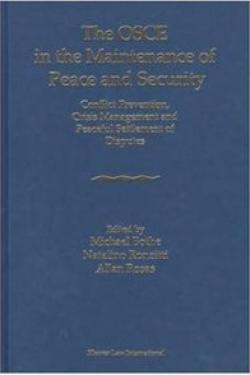The OSCE in the Maintenance of Peace and Security. Conflict Prevention, Crisis Management and Peaceful Settlement of Disputes

The main purpose of this research project was precisely to analyse some features of the emerging security framework, and put them into a political, institutional and legal (normative) perspective. It was decided to focus on the Organization on Security and Cooperation in Europe (OSCE), one of the institutions with the broadest membership and among the main players in the maintenance of peace and security in Europe. In particular, three types of OSCE activities were chosen in this respect: conflict prevention and crisis management, peace-keeping, and peaceful settlement of disputes.
Result of a research project conducted by the Istituto Affari Internazionali (IAI) in cooperation with the Institute of Public Law, Johann Wolfgang Goethe University of Frankfurt, and the Department of Law, Åbo Academy University (Turku).
Preface, p. ix-x
About the Authors, p. xi-xiii
Acronyms, p. xv-xviii
Tables and figures, p. xix
1. The OSCE: Institutional and Functional Developments in an Evolving European Security Order, Kari Möttölä, p. 1-33
2. The OSCE Main Political Bodies and Their Role in Conflict Prevention and Crisis Management, Arie Bloed, p. 35-52
3. Dispute Settlement Procedures and Crisis Management, Berthold Meyer, p. 53-81
4. The Role of the Human Dimension of the OSCE in Conflict Prevention and Crisis Management, Merja Pentikäinen, p. 83-122
5. The High Commissioner on National Minorities: Development of the Mandate, María Amor Martín Estébanez, p. 123-165
6. OSCE Long-Term Missions, Allan Rosas and Timo Lahelma, p. 167-190
7. The United Nations and Regional Organizations in the Maintenance of Peace and Security, Andrea Gioia, p. 191-236
8. OSCE Peace-keeping, Natalino Ronzitti, p. 237-255
9. Relations Between the OSCE and NATO with Particular Regard to Crisis Management and Peace- Keeping, Lamberto Zannier, p. 257-265
10. Third Party Peace-keeping and the Interaction between Russia and the OSCE in the CIS Area, Ettore Greco, p. 267-288
11. Division of Labour Between the UN and the OSCE in Connection with Peace-keeping, Gianluca Burci, p. 289-313
12. Financing Peace-keeping and Peace-related Operations. The UN and OSCE Practice, Fabrizio Pagani, p. 315-341
13. Dispute Settlement Procedures in the OSCE: Genesis and Overview, Torsten Lohmann, p. 343-365
14. The Various Dispute Settlement Procedures: General International Law and OSCE Practice, Michael Bothe, p. 367-379
15. The OSCE Court of Conciliation and Arbitration: Some Facts and Issues, Lucius Caflisch, p. 381-408
16. The Role of Conciliation and Similar Proceedings in International Dispute Settlement and the OSCE Procedures, Torsten Lohmann, p. 409-424
17. Subsidiarity and Other Obstacles to the Use of the OSCE Dispute Settlement Procedures, Susanne Jacobi, p. 425-458
18. Nagorno-Karabakh: A Case-Study of OSCE Conflict Settlement, Rexane Dehdashti, p. 459-478
19. The Role of the OSCE in the Former Yugoslavia after the Dayton Peace Agreement, Mario Sica, p. 479-493
20. The OSCE Mediterranean Dimension: Conflict Prevention and Management, Roberto Aliboni, p. 495-509
21. Conclusions and Perspectives, Michael Bothe, Natalino Ronzitti and Allan Rosas, p. 511-518
Index, p. 519-557


